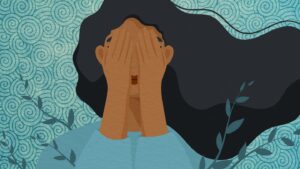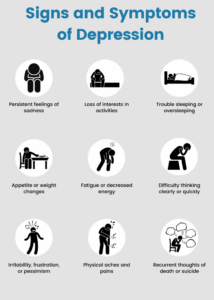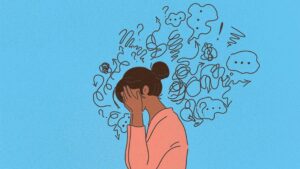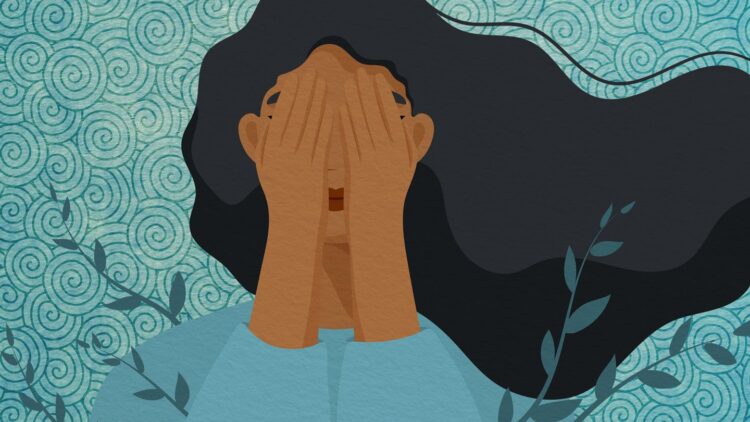It’s easy to feel completely alone when you’re suffering from depression.
It’s possible that you believe you’re the only one in the world who feels this way. It can be isolating, if not crippling. It can feel unwieldy if left untreated, as if you have no control over yourself or your feelings. You may believe that no one understands what you’re going through. Perhaps you’re a caregiver who is witnessing a loved one’s struggle with depression. Perhaps it’s a sibling, a parent, or a child. You may feel as if you’re watching your loved one fade away.
You may be surprised to learn that depression is more common than you think. In fact, depression affects 264 million people worldwide.Credible studies have shown that In Malaysia, it is the most common mental illness reported with approximately 2.3 million people being affected at some point of their lives.

However, depression is much more complex than simply being sad.
You’re not alone if you’re suffering from depression or supporting a loved one who is. It is possible to live a happy, healthy life while suffering from depression. It does, however, necessitate an understanding of the disorder, its symptoms, causes, and how to seek help.
What is Depression?
Depression is a common but serious mental health condition that affects your thoughts, feelings, and behaviors. Depression can cause health problems. These issues range from mental and emotional health to physical fitness and well-being. Depression, like mental illness, is classified on a scale that ranges from severe to mild. Those who suffer from depression, on the other hand, have some common symptoms.
The Symptoms
- Feelings of sadness (or depression) that don’t seem to go away
- Loss of interest or pleasure in previously enjoyed activities
- Appetite changes, especially at extremes (weight loss or weight gain unrelated to dieting)
- Sleeping problems — or sleeping too much (insomnia or hypersomnia)
- Increased exhaustion (or loss of energy)
- Increase in “busy” activities that aren’t productive or have no purpose (i.e. inability to sit still, pacing around, unable to focus)
- Feeling insignificant
- Having trouble concentrating, focusing, or making decisions
- Thoughts of death, suicide, or suicidal ideation on a regular basis

Even if you did not get a diagnosis and you exhibit more than 5 of these symptoms, chances of you having depression is high and it is best to seek help. With neurological study advancements, there are so many alternative ways of healing. Find one that suits you.
Causes
Like any condition for our physical health, one must always try to go back to the root of the cause. That way, we understand ourselves much better and will aid in healing.
The 5 Common causes
Trauma
Trauma, particularly childhood trauma, can play a significant role in the development of depression. When people are exposed to a shocking or traumatic event, it leaves an indelible mark. It’s natural for the brain to react when something frightening or stressful occurs. However, over time, this can alter how the brain responds, potentially leading to depression.
Genetics
Mood disorders (such as depression) can unfortunately run in families. If you’re unsure about your family’s past, do some research. It’s best to inquire with your doctor about any mental illnesses that may run in your family.
Life circumstances
The quality of your life has a huge impact on your mental + physical health. Relationship changes or financial hardships can cause depression due to stress and anxiety of the change. Other common situations you will hear of is grief, the pandemic and many other factors. The sky is the limit, truly when it comes to a humans life circumstances.
Other medical conditions
It’s possible that depression is caused by another medical condition. A person who suffers from insomnia, for example, is more likely to develop depression. Depression can also occur as a result of other medical conditions. Chronic pain, anxiety, and attention deficit hyperactivity disorder are just a few of the conditions (ADHD). Depression symptoms can also be caused by certain medications used to treat other medical conditions.
Substance use or abuse (drugs and alcohol)
Alcohol and drugs have a vicious, cyclical relationship with depression. One-third of clinically depressed people are said to abuse drugs and alcohol. Self-medicating with drugs and alcohol is common. While only temporary, it can help with low self-esteem, worthlessness, and hopelessness.

However, depression and substance abuse share a genetic and neurological link. When someone is at risk for depression, they are also at risk for substance abuse. If you or a loved one is depressed, seek help from a mental health professional. While substances may appear to temporarily alleviate symptoms, they are part of a dangerous cycle.
We’re all individuals with distinct brains and bodies. There is no way to isolate a single symptom of depression. Everyone deals with depression in their own unique way. Depressive disorders manifest themselves in various ways in different people. But, in general, if you’ve been suffering for more than two weeks, it’s time to see a doctor.
It’s important to remember that depression doesn’t just manifest itself in your mind. You can also notice depression symptoms in your body. Physical pain, lethargy, loss of sleep and self sabotaging; and many others.
3 techniques to cope!
Living with depression does not mean you will be in that particular loop for a long time; well not for everyone at least. Learning how to cope and building mental strength will help to a certain extent. No one solution “cures” depression.
Taking good care of your physical body

Physical well-being is crucial. Taking care of your body will help you take care of your mind as well. When dealing with depression, consider adding some of these tools to your physical well-being toolbox. You can start slow with a 10 minute walk around your block or have a weekly check in with your friends. Yoga has been proven time on time again about how efficient it is for pain management. Exploring what sparks joy for you will be a fulfilling yet tiring journey. You will eventually find a type or a few types of body movement that you truly enjoy, if you allow yourself a little self exploration.
Be aware of your thoughts
Those automatic, negative thoughts are likely to creep in if you’re suffering from depression. It’s easy to become overwhelmed. Cognitive behavioural therapy (CBT) and other therapies can help in this area. However, there are some things you can do on your own to deal with negative thoughts.

Submitting journal entrees and reflecting on them every now and then has personally helped me. There is no specific formula but you can start with writing down about the things you love about yourself. Starting it is the most important part.
Acknowledge the unhealthy behaviors and change them
To self-soothe, we may turn to unhealthy behaviours. We can, however, change our lifestyles if we have the right level of self-awareness. It is possible to substitute positive behaviours for negative or unhealthy ones. Keep track of how you feel after making changes to your lifestyle. You might develop some long-term healthy habits. What percentage of your time do you spend on social media? After spending time on social media, how do you feel? Try unplugging for a day or two if you don’t feel better after engaging with social media. What are some of the things you’ve noticed about your thought patterns?
Or
Practice self-compassion and self-care. Take a hot bath or shower. Simple things like brushing your hair or dressing nicely can make a significant difference in how we feel.
Try something and most importantly, try sticking to it to really see its full effects.
I will leave you with this last thought that helps us heal as a collective. When in doubt, lead with love and kindness, to yourself and your surroundings. It is arguably the only way for us to move forward to experience life with lesser pain; which loosely translates to being more present in your day to day; building memories that will replay on your mind.
If you are unaware, admit it and learn up. It is as simple as that because no one has the answers to this thing called LIFE. Taking the first step to admit not knowing liberates and inspires a person to understand better. There are numerous online resources available to help you learn more about the subject. Hopefully this article is added to your list.
Follow us on Instagram, Facebook or Telegram for more updates and breaking news.








